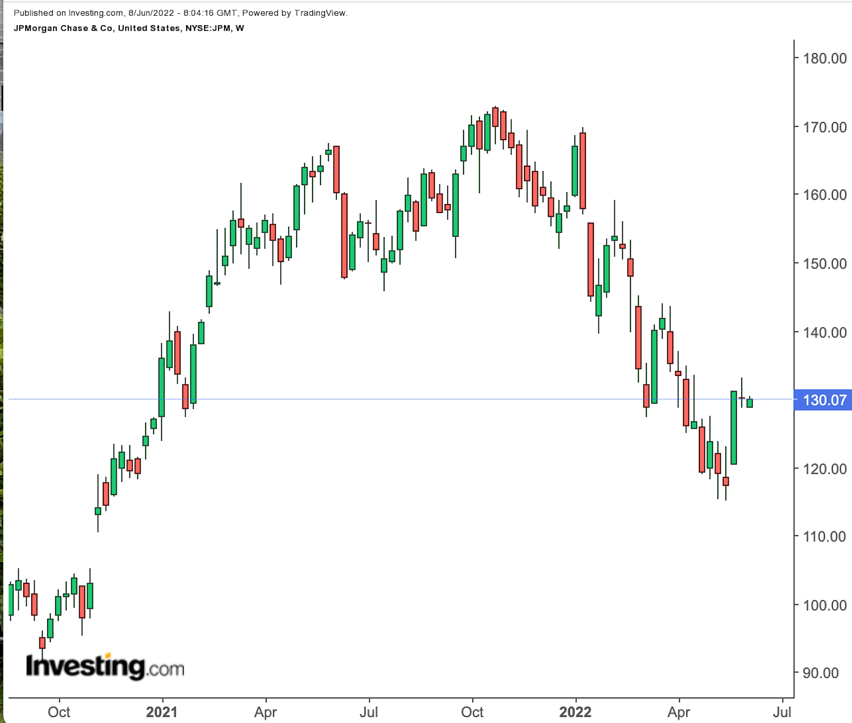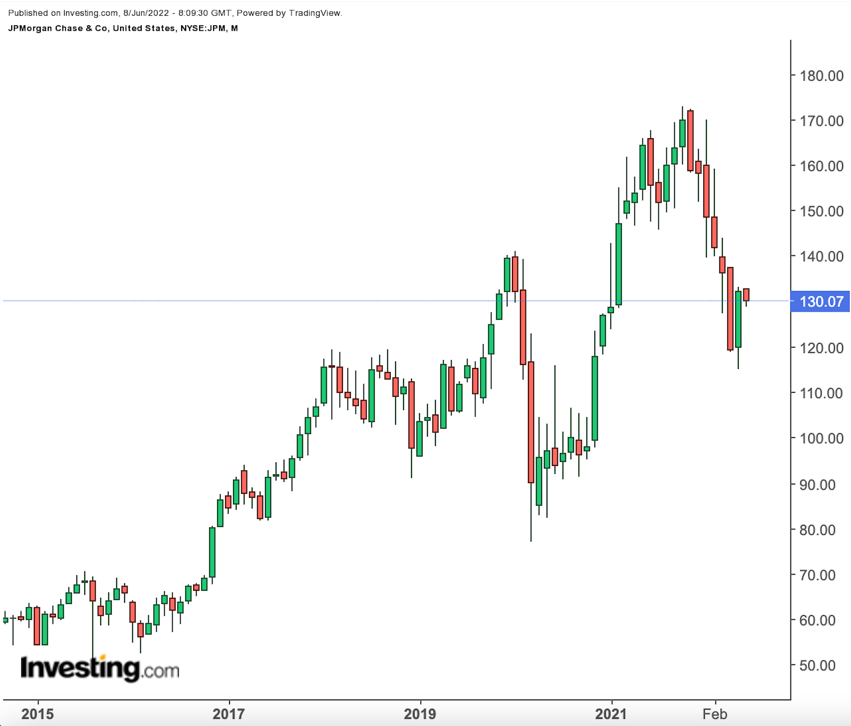Bank of America, Morgan Stanley, Nvidia and Dollar Tree rise premarket
This article was written exclusively for Investing.com
Last week, a highly-respected financial executive strongly suggested that investors shouldn't buy JPMorgan Chase (NYSE:JPM) stock. That executive was the company's own chief executive officer, Jamie Dimon.
To be clear, Dimon didn't directly steer investors away from his company's shares. Rather, he was speaking to the macroeconomic environment. At a financial conference, the CEO referred to his own recent warning of “storm clouds” on the economic horizon—and upgraded the metaphorical forecast to a “hurricane.”

If Dimon is right, history shows that his company's stock is likely to take a hit. That alone might keep investors on the sidelines—and perhaps wisely so.
But it's not guaranteed that his forecast is on point. And even if it is, there's still an attractive long-term case for JPMorgan Chase stock here. A reasonable valuation and a big tailwind to earnings suggest the stock is a buy over the long haul—even if investors likely will have to ride out some volatility along the way.
The Danger In JPM Stock When The Economy Turns
Unsurprisingly, owning a bank stock during a recession almost always is a losing trade. JPMorgan has been no exception.
In early 2000, JPM stock peaked above $65. By 2003, it had lost more than two-thirds of its value. During that stretch, a global recession in 2001 was far from the only issue: the stock market crash that began in March of 2000 also played a role. Amid the dot-com bust, initial public offerings and acquisitions both declined significantly, hitting the investment banking business in a big way. Overall, even on an adjusted basis, JPMorgan's earnings per share declined 44% in 2001, and excluding restructuring costs dropped again the following year.
In 2007, JPM stock topped out at $53. By 2009, as the housing bubble burst, it was at $16. More recently, even fears of a macro pullback have spooked shares, which fell 21% during 2011 (a year dominated by the so-called “jobless recovery” from the financial crisis), and 9% during 2018 (when broad markets sold off sharply during the fourth quarter). Even though the economy at the moment is on solid ground (admittedly with significant inflation), the stock already has declined 18% so far this year.
Clearly, this is not a safe place to hide out if a recession indeed is around the corner, or even fears of that recession are likely to rise.
Is A Recession En Route?
That said, it's far from guaranteed that a recession is imminent. Dimon certainly isn't alone in seeing an elevated risk. But plenty of prognosticators believe the economy can survive inflationary pressures and higher interest rates. One of those optimists, in fact, is JPMorgan Chase's own chief economist.
Even if a downturn does arrive, it likely won't be quite as significant as that seen in 2008-09. Housing markets have gone crazy—but there's still no comparison to the housing market of the mid-2000s. U.S. equities may have further to fall from here—but the 2000-2002 bust incredibly saw the NASDAQ Composite index decline 77%.
And, again, JPM stock already has declined some 18%. No doubt the stock will have more room to fall if Dimon's dire prediction plays out—but perhaps not that much further to fall. Meanwhile, if it's the company's chief economist, rather than its chief executive officer, that is correct, JPM stock is likely to post a strong rebound.
The Mid-Term Catalyst for JPMorgan Chase Stock
Reasonable investors can disagree sharply on the near-term outlook for the economy. But taking a longer view, there's an attractive case for JPM stock at these levels.
For one, the stock is cheap. Shares trade at less than 12x this year's consensus earnings per share estimate and at about 1.5x book value.
Both multiples are in the middle of the company's historical range. Bears might argue that's precisely the problem, since a recession could reduce both earnings and book value as credit provisions rise and loans default.
But that analysis ignores a rather large tailwind: the boost to earnings from higher interest rates. Higher rates increase net interest margin, the spread between what JPMorgan pays to depositors and charges to lenders.
In 2021, JPMorgan's net interest income (NII) was roughly $44.5 billion, according to the company's fourth-quarter conference call. On that call, the bank guided for $50 billion in 2022. That forecast was then raised to $53 billion and, last month, $56 billion. By Q4, NII should be at a $66 billion run rate.
In other words, net interest income alone should boost pre-tax profit in 2023 by about $10 billion. That's about $2.50 per share after-tax, or more than 20% of expected earnings this year.
The macro picture can upend this outlook. A recession could lead the Federal Reserve to either pause planned interest rate increases, or reverse those hikes next year.
But JPMorgan's guidance highlights what earnings might look like when interest rates normalize. And, at some point, they will normalize.
In the meantime, investors can own a well-run bank—perhaps the best-run of the big U.S. banks—at an attractive valuation. After that, all they have to do is wait.
Disclaimer: As of this writing, Vince Martin has no positions in any securities mentioned.
***
Looking to get up to speed on your next idea? With InvestingPro+, you can find:
- Any company’s financials for the last 10 years
- Financial health scores for profitability, growth, and more
- A fair value calculated from dozens of financial models
- Quick comparison to the company’s peers
- Fundamental and performance charts
And a lot more. Get all the key data fast so you can make an informed decision, with InvestingPro+. Learn More »
